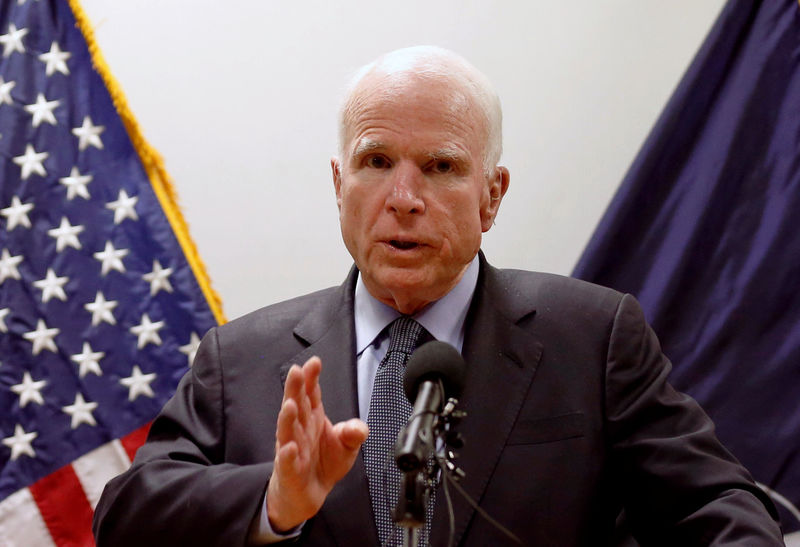By Yasmeen Abutaleb
WASHINGTON (Reuters) - Republicans expressed increasing pessimism on Sunday about the prospects for the healthcare bill in the U.S. Senate aimed at rolling back Obamacare as lawmakers prepared to return from a week-long recess.
One prominent Republican lawmaker, Senator John McCain, said he thought the Republican bill would probably fail.
"My view is that it's probably going to be dead," McCain, said on the CBS program "Face the Nation," adding that Republicans, who narrowly control the chamber, would likely need to work with Democrats on a healthcare bill.
President Donald Trump took to Twitter on Sunday to put pressure on Republicans to stay the course.
"For years, even as a "civilian," I listened as Republicans pushed the Repeal and Replace of ObamaCare. Now they finally have their chance!" he tweeted.
The Senate bill, which faces unified Democratic opposition, has been further imperiled during the recess, when Republican senators have had to return to their states and face constituents strongly opposed to the measure. Senators return to Washington on Monday.
The Senate bill keeps intact much of the 2010 Affordable Care Act, former Democratic President Barack Obama's signature legislation, popularly known as Obamacare, but strips away most of its funding.
It repeals most Obamacare taxes, overhauls the law's tax credits and ends its Medicaid expansion. It also goes beyond repealing Obamacare by cutting funding for the Medicaid program for the poor and disabled beginning in 2025.
At least 10 Republican senators have opposed the bill in its current form, but many more have criticized the legislation or said they are undecided. Republican Senator Bill Cassidy said on Sunday the draft bill was undergoing a "serious rewrite."
"Clearly, the draft plan is dead," he said on Fox News. "Is the serious rewrite plan dead? I don't know. I've not seen the serious rewrite plan."
Critics have derided the bill as a giveaway to wealthy Americans who would see some tax increases rolled back. Opponents also warn that the legislation would cause millions of poor and sick Americans to lose healthcare coverage.
The nonpartisan Congressional Budget Office, which assesses the impact of legislation, estimated 22 million people would lose health insurance over the next decade under the Senate bill. In a separate report, it found the proposal would cut government spending on Medicaid by 35 percent come 2036.
CRUZ: FAILURE 'NOT AN OPTION'
White House chief of staff Reince Priebus said on Fox News on Sunday that Trump expected Congress to pass a bill to repeal and replace Obamacare before lawmakers leave Washington for their August recess.
A spokesman for Majority Leader Mitch McConnell said Senate leadership was continuing to work with Republican senators and the CBO on the legislation, but did not comment on McCain's remarks or the bill's future.
Republican Senator Ted Cruz said on Sunday that failure to pass the bill was "not an option" and that the Senate effort must focus on lowering premiums. He pointed to an amendment he offered that is being scored by the CBO.
Cruz's amendment would allow insurers to offer plans that do not comply with Obamacare's mandate that they charge sick and healthy people the same rates and cover a set of essential health benefits, such as maternity care and prescription drugs, as long as they also offer plans that do comply with the regulations.
Cruz's amendment has drawn support from conservative senators and groups, who say the amendment will help lower premiums. But moderate Republicans and outside critics say it will erode protections for people with pre-existing conditions and make their insurance unaffordable.
McConnell has said he plans to hold a vote on the legislation, which needs the support of at least 50 of the Senate's 52 Republicans, before a six-week recess that begins on July 29. The Republican-controlled House of Representatives passed its version of a bill overhauling healthcare in May.

Yet McConnell himself voiced doubts on the Senate bill's prospects last week, telling a luncheon in his home state of Kentucky that if Republicans fail to pass a repeal of Obamacare, they may need to work with Democrats to shore up private health insurance markets to keep them from collapsing.